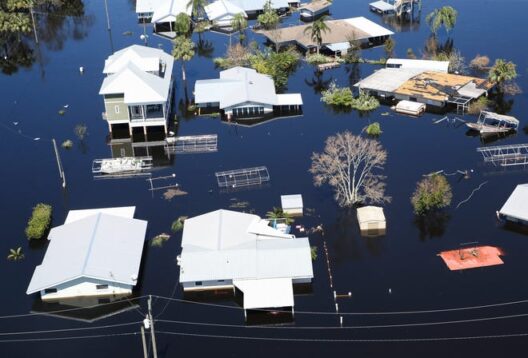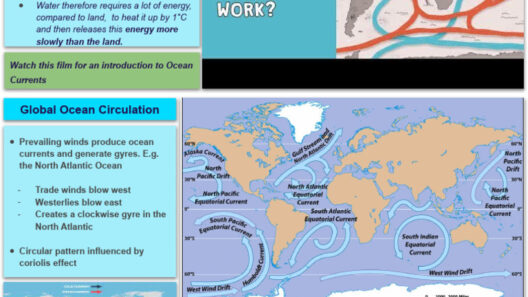The oceans, covering approximately 71% of the planet’s surface, play an indispensable role in regulating the Earth’s climate. However, the question arises: Are oceans absorbing the brunt of climate change? Recent research indicates a disturbing truth: our oceans not only act as a buffer against climate change but are, in fact, absorbing significant portions of the excess heat and greenhouse gases produced by human activities. This phenomenon, often underestimated, warrants a closer examination.
The capacity of oceans to absorb heat is substantial. It is estimated that the oceans have absorbed over 90% of the excess heat generated by greenhouse gas emissions since the late 20th century. This process occurs via a mechanism known as thermal expansion, where water expands as it warms. The ramifications of this absorption are manifold; they alter marine ecosystems, contribute to sea-level rise, and precipitate a series of cascading effects that threaten biodiversity and human livelihoods.
One of the most pressing consequences of ocean warming is the phenomenon of coral bleaching. Coral reefs, which are among the most biodiverse ecosystems on the planet, are exceedingly sensitive to temperature changes. When water temperatures rise significantly, corals expel the symbiotic algae living in their tissues, leading to a loss of color and, ultimately, the coral’s death if conditions do not improve. The implications of widespread coral bleaching extend beyond aesthetic concerns; coral reefs support approximately 500 million people globally, providing food, income, and coastal protection. When reefs die, so too do the communities dependent on them.
Moreover, the warming oceans disrupt marine food chains. Fish species are shifting their habitats in response to changing temperatures and shifting currents. As these species migrate, the traditional fishing grounds experience a decline, creating economic rifts for fishermen whose livelihoods depend on stable stocks. A shift in species distribution can also lead to increased competition among fishers and potentially heighten tensions among nations reliant on this vital resource.
The oceans are not only absorbing heat, but they are also acting as a carbon sink, absorbing approximately a third of the carbon dioxide emitted by human activities. This process softens the immediate impacts of climate change; however, it is not without detrimental side effects. As the oceans absorb more carbon dioxide, the resultant increase in acidity poses a serious threat to marine life. Acidification disrupts the calcification processes in shellfish and threatens species critical to the marine food web, including mollusks and crustaceans. The economic implications of declining shellfish populations are staggering, given their prominence in global seafood markets.
It is crucial to recognize the varying impacts of climate change across different oceanic regions. The polar oceans, for instance, are experiencing some of the most significant changes. In the Arctic, rapid melting of sea ice is a direct consequence of increased ocean temperatures, leading to a positive feedback loop that further exacerbates warming. Melting ice contributes to rising sea levels, poses threats to coastal communities, and disrupts the habitats of species such as polar bears and seals. The Alaskan coastline, where indigenous communities rely heavily on marine resources, faces particularly stark challenges.
Despite the alarming changes occurring in our oceans, there exists a glimmer of hope. Protecting marine ecosystems through sustainable practices can mitigate some of the adverse effects of climate change. Marine protected areas (MPAs) have garnered attention as a valuable tool for safeguarding biodiversity while simultaneously enhancing the resilience of ocean life. By restricting human activities in designated regions, MPAs can facilitate recovery for depleted fish stocks, promote ecosystem health, and bolster the resilience of coral reefs against climate change.
Transitioning to sustainable fishing practices is equally vital. Overfishing depletes marine species faster than they can replenish, further straining the delicate balance of oceanic ecosystems. Implementing policies that promote sustainable quotas, seasonal closures, and bycatch reduction can help ensure the long-term viability of marine resources.
Furthermore, addressing climate change at its source is imperative. Reducing greenhouse gas emissions through a transition to renewable energy sources, enhancing energy efficiency, and fostering a culture of conservation can positively influence oceanic health. Initiatives like reforestation and soil restoration sequester carbon, benefiting not only terrestrial ecosystems but also the oceans.
Ultimately, the oceans are absorbing the brunt of climate change, a stark reality that necessitates urgent action and global cooperation. The depth of their commitment to absorbing anthropogenic heat and carbon dioxide underscores the vital role oceans play in our planet’s health. However, in doing so, they are paying a significant price, wreaking havoc on their ecosystems and, consequently, the human communities that depend on them.
The call to action could not be clearer. It is incumbent upon us to recognize the interconnectedness of our actions and the oceans’ plight. Without a systemic shift toward sustainability and environmental stewardship, we risk plunging into further ecological decline. In short, the health of the oceans is not just a marine issue; it is a global concern that requires our immediate and concerted attention.








